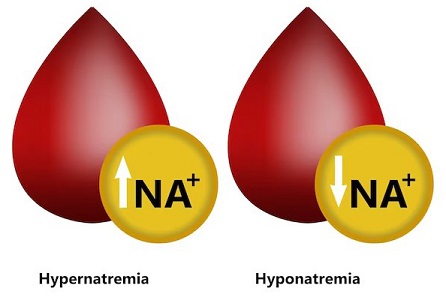Nikhil Prasad Fact checked by:Thailand Medical News Team Jun 23, 2024 1 year, 6 months, 5 days, 21 hours, 3 minutes ago
COVID-19 News: The COVID-19 pandemic has revealed numerous complications beyond the well-known respiratory issues. One of the less obvious but critical complications is dysnatremia, an imbalance in sodium levels in the blood. This condition has emerged as a significant factor in the prognosis and mortality of COVID-19 patients, particularly those admitted to intensive care units (ICU). A recent study conducted in Ankara, Turkey that is covered in this
COVID-19 News report, sheds light on the importance of managing electrolyte levels to improve patient outcomes.
 Electrolyte Imbalance and COVID-19: A Deadly Combination in ICU Patients
Understanding Dysnatremia
Electrolyte Imbalance and COVID-19: A Deadly Combination in ICU Patients
Understanding Dysnatremia
Dysnatremia is a dysfunctional state of sodium levels in a body and can refer to both hyponatremia (low sodium levels) and hypernatremia (high sodium levels). Sodium is crucial for maintaining fluid balance, nerve function, and muscle contractions. Any imbalance can lead to severe health issues, including neurological problems and cardiovascular complications. In the context of COVID-19, dysnatremia has been linked to worse outcomes, including an increased need for mechanical ventilation and higher mortality rates.
The Study: Key Findings
Researchers analyzed data from 209 COVID-19 patients admitted to the ICU between April 2021 and March 2022. The study focused on the relationship between sodium levels at admission and patient outcomes. Here's what they found:
-High Mortality Rate: Patients with hypernatremia at admission had a significantly higher mortality rate. Out of the 209 patients, 124 (59.3%) did not survive their ICU stay.
-Mechanical Ventilation: Hypernatremia was strongly associated with the need for invasive mechanical ventilation (IMV). Patients with high sodium levels often required longer durations of IMV.
-Inotropic Support: There was a notable correlation between hypernatremia and the need for inotropic support, which helps manage blood pressure and cardiac function.
-Comorbidities: Conditions like diabetes mellitus and chronic renal failure were more common in patients with hypernatremia, exacerbating the severity of COVID-19.
Why Sodium Levels Matter
Sodium imbalances can result from several factors in COVID-19 patients. These include dehydration due to fever, increased respiratory rate leading to insensible fluid loss, and gastrointestinal symptoms. The virus can also affect the body's hormonal regulation of sodium, further complicating the situation.
Hyponatremia typically occurs due to the effect of antidiuretic hormone (ADH), leading to water retention and diluted blood sodium levels. Symptoms can range from mild to severe, with neurological symptoms like confusion and seizures in extreme cases. On the other hand, hypernatremia is usually caused by a deficit of total body water or an inappropr
iately high sodium intake, often seen in patients with severe dehydration or those receiving high sodium content in IV fluids.
The Importance of Proper Electrolyte Management
Effective management of sodium levels is crucial in treating COVID-19 patients, especially those in the ICU. This involves:
-Regular Monitoring: Frequent checks of blood sodium levels to detect imbalances early. This helps in timely intervention and prevents complications.
-Fluid Management: Careful administration of fluids to avoid both dehydration and fluid overload. Tailoring fluid intake according to individual patient needs is essential.
-Tailored Treatments: Adjusting treatment plans based on individual patient needs, including the use of electrolyte solutions and medications to manage sodium levels.
Implications for Healthcare Providers
The findings from the study underscore the need for heightened awareness and proactive management of electrolyte imbalances in ICU patients. Hypernatremia, in particular, poses a significant risk and requires vigilant monitoring and intervention. Healthcare providers must be equipped to handle these challenges by adopting best practices for electrolyte management.
A Broader Perspective on COVID-19 Complications
While respiratory symptoms are the hallmark of COVID-19, this disease affects multiple body systems. Understanding and addressing complications like dysnatremia can significantly improve patient outcomes. Electrolyte imbalances, though less visible, can be as deadly as the respiratory failure itself. This highlights the complexity of treating COVID-19 and the need for a comprehensive approach to patient care.
The Role of Comorbidities
The study also found that patients with underlying conditions such as diabetes mellitus and chronic renal failure were more prone to develop hypernatremia. These comorbidities can exacerbate the disease course, making management even more challenging. Therefore, personalized treatment plans considering these comorbidities are crucial for better outcomes.
Conclusion: A Call to Action
The study conducted in Ankara provides valuable insights into the management of COVID-19 patients in the ICU. It highlights the critical role of electrolyte balance in determining patient outcomes. By focusing on proper management of sodium levels, healthcare providers can improve survival rates and reduce complications in critically ill patients.
As we continue to battle the COVID-19 pandemic, it is essential to recognize and address all facets of the disease. Dysnatremia may not be as well-known as other complications, but its impact on patient mortality is significant. This calls for a concerted effort to ensure that all COVID-19 patients, especially those in the ICU, receive comprehensive care that includes meticulous management of electrolyte levels.
By addressing this silent killer, we can enhance patient care and outcomes, ultimately saving more lives in the ongoing fight against COVID-19. Healthcare systems worldwide must incorporate these findings into their treatment protocols to better manage the multifaceted challenges posed by this pandemic.
The study findings were published in the peer reviewed journal: Medicina.
https://www.mdpi.com/1648-9144/60/7/1019
For the latest
COVID-19 News, keep on logging to Thailand Medical News.
Read Also:
https://www.thailandmedical.news/news/dysnatremia-a-common-manifestation-in-covid-19-a-deep-dive-into-the-colos-study
https://www.thailandmedical.news/news/covid-19-news-study-finds-that-hypernatremia-was-frequently-observed-in-covid-19-patients-who-were-critically-ill-and-died
https://www.thailandmedical.news/news/thailand-medical-news-exclusive-many-exposed-to-the-sars-cov-2-are-experiencing-mild-to-moderate-hypokalemia-or-fluctuations-in-potassium-levels
